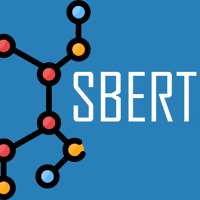language:
- en
license: apache-2.0
library_name: sentence-transformers
tags:
- sentence-transformers
- feature-extraction
- sentence-similarity
- transformers
pipeline_tag: sentence-similarity
msmarco-distilbert-dot-v5
This is a sentence-transformers model: It maps sentences & paragraphs to a 768 dimensional dense vector space and was designed for semantic search. It has been trained on 500K (query, answer) pairs from the MS MARCO dataset. For an introduction to semantic search, have a look at: SBERT.net - Semantic Search
Usage (Sentence-Transformers)
Using this model becomes easy when you have sentence-transformers installed:
pip install -U sentence-transformers
Then you can use the model like this:
from sentence_transformers import SentenceTransformer, util
query = "How many people live in London?"
docs = ["Around 9 Million people live in London", "London is known for its financial district"]
#Load the model
model = SentenceTransformer('sentence-transformers/msmarco-distilbert-dot-v5')
#Encode query and documents
query_emb = model.encode(query)
doc_emb = model.encode(docs)
#Compute dot score between query and all document embeddings
scores = util.dot_score(query_emb, doc_emb)[0].cpu().tolist()
#Combine docs & scores
doc_score_pairs = list(zip(docs, scores))
#Sort by decreasing score
doc_score_pairs = sorted(doc_score_pairs, key=lambda x: x[1], reverse=True)
#Output passages & scores
print("Query:", query)
for doc, score in doc_score_pairs:
print(score, doc)
Usage (HuggingFace Transformers)
Without sentence-transformers, you can use the model like this: First, you pass your input through the transformer model, then you have to apply the correct pooling-operation on-top of the contextualized word embeddings.
from transformers import AutoTokenizer, AutoModel
import torch
#Mean Pooling - Take attention mask into account for correct averaging
def mean_pooling(model_output, attention_mask):
token_embeddings = model_output.last_hidden_state
input_mask_expanded = attention_mask.unsqueeze(-1).expand(token_embeddings.size()).float()
return torch.sum(token_embeddings * input_mask_expanded, 1) / torch.clamp(input_mask_expanded.sum(1), min=1e-9)
#Encode text
def encode(texts):
# Tokenize sentences
encoded_input = tokenizer(texts, padding=True, truncation=True, return_tensors='pt')
# Compute token embeddings
with torch.no_grad():
model_output = model(**encoded_input, return_dict=True)
# Perform pooling
embeddings = mean_pooling(model_output, encoded_input['attention_mask'])
return embeddings
# Sentences we want sentence embeddings for
query = "How many people live in London?"
docs = ["Around 9 Million people live in London", "London is known for its financial district"]
# Load model from HuggingFace Hub
tokenizer = AutoTokenizer.from_pretrained("sentence-transformers/msmarco-distilbert-dot-v5")
model = AutoModel.from_pretrained("sentence-transformers/msmarco-distilbert-dot-v5")
#Encode query and docs
query_emb = encode(query)
doc_emb = encode(docs)
#Compute dot score between query and all document embeddings
scores = torch.mm(query_emb, doc_emb.transpose(0, 1))[0].cpu().tolist()
#Combine docs & scores
doc_score_pairs = list(zip(docs, scores))
#Sort by decreasing score
doc_score_pairs = sorted(doc_score_pairs, key=lambda x: x[1], reverse=True)
#Output passages & scores
print("Query:", query)
for doc, score in doc_score_pairs:
print(score, doc)
Technical Details
In the following some technical details how this model must be used:
| Setting | Value |
|---|---|
| Dimensions | 768 |
| Max Sequence Length | 512 |
| Produces normalized embeddings | No |
| Pooling-Method | Mean pooling |
| Suitable score functions | dot-product (e.g. util.dot_score) |
Evaluation Results
For an automated evaluation of this model, see the Sentence Embeddings Benchmark: https://seb.sbert.net
Training
See train_script.py in this repository for the used training script.
The model was trained with the parameters:
DataLoader:
torch.utils.data.dataloader.DataLoader of length 7858 with parameters:
{'batch_size': 64, 'sampler': 'torch.utils.data.sampler.RandomSampler', 'batch_sampler': 'torch.utils.data.sampler.BatchSampler'}
Loss:
sentence_transformers.losses.MarginMSELoss.MarginMSELoss
Parameters of the fit()-Method:
{
"callback": null,
"epochs": 30,
"evaluation_steps": 0,
"evaluator": "NoneType",
"max_grad_norm": 1,
"optimizer_class": "<class 'transformers.optimization.AdamW'>",
"optimizer_params": {
"lr": 1e-05
},
"scheduler": "WarmupLinear",
"steps_per_epoch": null,
"warmup_steps": 10000,
"weight_decay": 0.01
}
Full Model Architecture
SentenceTransformer(
(0): Transformer({'max_seq_length': 512, 'do_lower_case': False}) with Transformer model: DistilBertModel
(1): Pooling({'word_embedding_dimension': 768, 'pooling_mode_cls_token': False, 'pooling_mode_mean_tokens': True, 'pooling_mode_max_tokens': False, 'pooling_mode_mean_sqrt_len_tokens': False})
)
Citing & Authors
This model was trained by sentence-transformers.
If you find this model helpful, feel free to cite our publication Sentence-BERT: Sentence Embeddings using Siamese BERT-Networks:
@inproceedings{reimers-2019-sentence-bert,
title = "Sentence-BERT: Sentence Embeddings using Siamese BERT-Networks",
author = "Reimers, Nils and Gurevych, Iryna",
booktitle = "Proceedings of the 2019 Conference on Empirical Methods in Natural Language Processing",
month = "11",
year = "2019",
publisher = "Association for Computational Linguistics",
url = "http://arxiv.org/abs/1908.10084",
}
License
This model is released under the Apache 2 license. However, note that this model was trained on the MS MARCO dataset which has it's own license restrictions: MS MARCO - Terms and Conditions.

